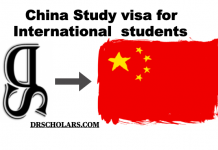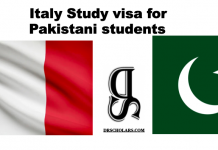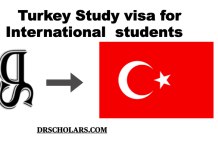After getting admission to your desired Japanese university, the next step is to apply for a Japan study visa.
This blog will explain the whole process and reasons why an applicant should prefer studying in Japan.
According to the QS ranking of 2023, 5 of the Japanese universities include in the top 100 list of the world.
61.5% of adults aged 25-34 have completed post-secondary education.
Japan is a country of development, and technology, and is famous for high-quality academics.
Scholarships in Japan are additional factors for foreign students to apply for a Japan study visa.
But Most of the online information about the topic is either incomplete or outdated.
This is why we felt the urge to write one ultimate Japan student visa guide, which will not only answer every query but will also prepare international students step by step.
Let’s dive in!
Want to study in Japan for free? Check our ultimate guide about MEXT scholarship Japan.
Japan study visa
1. Types of Japan Study Visa for International Students
2. Visa Exempted Countries for Japan
3. Visa fee for Japan Study Visa
4. Japan Embassies and Consulate for Students
5. Visa processing time for Japan Study Visa
6. Documents Required for Japan Study Visa
7. How to Apply for Japan Study Visa
8. Interview Questions for Japan Study Visa
10. Japan Student Visa Success Rate
Check our detailed guide about Finland student visa.
1. Types of Japan Study Visa for International Students
1.1. Short-term Stay for Japan Study Visa
Those students who want to learn language programs or short courses or some cultural/sports events which only require them to stay in Japan for less than 90 days, then they will apply for a short-term student visa.
Students from some countries can even visit Japan for a short stay without a visa.
Remember Short-Term visa can’t be extended.
Check our detailed guide about Spain’s student visas.
1.2. Long-Term Stay for Japan Study Visa
Those students who wish to study in Japan for more than 90 days will apply for a long-term student visa.
In most cases, if the student is applying for a full-time Bachelor’s or Master’s or PhD (Or research). Their course will take more than 90 days, so they should apply for a Long-term visa.
It can extend up to 2 years.
Students who are interested to study degree programs and learn Japanese language courses and whose stay is longer than 3 months will also apply for this long-term student visa for Japan.
Here is our detailed guide about the Netherlands Study visa.
2. Japan Visa-Exempted Countries
Japan has adopted measures regarding visa exemption in several regions and countries. They include these countries on the list of visa exemption agreements.
Students need to check the website of the Japanese Ministry of Foreign Affairs to see the list of exemption countries and then apply for a study visa in Japan.
Students get benefits from this visa exemption agreement and take regular courses with no visa.
Those students who are from countries not included in the agreement list will be needed to apply for the Japan visa according to their needs.
Check our detailed guide about Norway student visas.
3. Japan Study Visa fee
The visa fee for a Short-term Japan study visa is 20 US Dollars and for a Long-Term visa, it is 40 US Dollars.
Students must submit the fee in the country’s currency in which Consulate General/Embassy is located.
Fees may be different or may not be required depending on the visit and nationality.
Sometimes, the visa processing fee is also required along with the visa issuance fee for a study in Japan. If a student is submitting a visa application through an approved agency of the Consulate General / Embassy of Japan fee may be different.
|
Types of Visas |
Visa Fees |
|
Short-Term Visa |
20 US Dollars |
|
Long-Term Visa |
40 US Dollars |
Check our detailed guide for Denmark study visa.
4. Japan Embassies and Consulate for Students
Japan has Consulates, Embassies, and Permanent Missions all over the world. Students can find information on the website of the Japanese Embassy and Consulates.
Other important websites for students are Study in Japan and Jasso.
Check step by step process of the Italy study visa.
5. Visa processing time for Japan Study Visa:
According to Japan’s Ministry of Foreign Affairs, the Visa processing time for Japanese study visas is 5 working days from visa application to visa issuance.
The time starts from visa application receipt.
However, in general, the visa process time for students could vary because of
Applicant’s Nationality,
Japanese Embassy in that particular region,
The number of applicants,
Type of visa (University, college, Religious institution, Research, training, etc)
and
Sometimes specific requirements of the Applicant’s case.
However, the standard recommended process time is mentioned above.
In case of any problem with visa application, the Consulate General / Embassy transmits visa application to the Ministry of Foreign Affairs in Tokyo.
The Ministry of Foreign Affairs will clarify visas and visa issuance may take more than a month.
So, it’s better to apply for a visa application before the travel date.
Issuance of a visa may even take a long time up to three months in case of missing documents.
If You have any questions related to your Japan study visa or any other study visa, you can also contact us for a live one-on-one session.
Whatsapp Contact: +393512735708
If you want to study in the UK, check our ultimate UK study visa guide.
6. Documents Required for Japan Study Visa
6.2. Passport-size photographs
6.7. IELTS for Japan Study Visa
6.8. Statement of Purpose/Letter of Motivation/Cover Letter
6.10. Certificates of Eligibility (COE) for Japan Study Visa
6.11. Proof of Bank Statement for Japan Study Visa
6.12. Tax Number and Social Security Card for Japan Study Visa
6.13. Health Insurance for Japan Study Visa
6.14. Letter of Guarantee for Japan Study Visa
6.15. Proof of university Legal Fees
6.16. Receipt of Visa Processing Fee
6.17. Copy of Hotel Reservation & Flight Booking
6.18. Family Registration Certificate (FRC)
6.19. No Objection Certificate (Optional)
6.20. PCC (Police Clearance Certificate) for Japan study Visa
6.21. Certificates of extracurricular achievements
6.22. Corona Vaccination Certificates
6.23. Marriage and Childbirth Certificate (Optional)
6.1. Visa Application Form
Carefully fill out the correct Japan visa application form & submit it.
The students can access the application form for short-term student visas & long-term student visas here.
Students can also contact their embassy or consulate of Japan if they have any queries.
Remember in some countries the visa applications are received by external service providers like VFS Global etc.
6.2. Passport-size photographs
The general picture format for a Japan study visa is the following.
A: Two recent (within 6 months) passport-size (35x45mm) photos.
B: White background with neutral facial expressions. (Unedited)
C: Avoid uniforms & the head should be 80% in the photo.
D: The applicant should look at the camera.
E: Applicant should glue One photograph to the visa application
6.3. Valid Passport
A: A passport must have at least 18 months of validity from the visa application.
B: Applicants will also provide visa copies (if they have any).
C: The passport must have at least two blank pages
D: All the previous passports must also be attached. (If they have any)
6.4. CNIC
A birth certificate and a National Identity card are essential for a Japanese student visa.
6.5. Academic Documents
It includes all academic records & certificates.
A. Certificate & transcript of Bachelor’s (If a student is applying for a master’s program)
B. Certificate & transcript of Master’s (If a student is applying for a Ph.D. program)
C. Transcript (DMCs) of Metric & FSC and certificates (if a student is applying for a bachelor’s degree)
D. Proficiency certificate in English from the university.
E. Course summary which explains current courses & previous courses.
F. Provide two Recommendation Letters from your university along with the referee’s detail.
6.5.1. Translated Documents (If it’s not in English)
A. Confirmation from Translation Company/Translator
B. Translation Date
C. Name and Signature of the Translator
D. Translator’s Contact Details
NOTE:
The above-mentioned documents must be attested by respective universities and boards.
For example, in the case of Pakistan, it must be attested by IBCC, HEC, and MOFA (Ministry of Foreign Affairs).
IBCC authority is only responsible for the attestation of metric and inter documents.
Dear offices are present in Peshawar, Karachi, Lahore, Islamabad, and also in other cities of Pakistan.
HEC office attests to Bachelor’s, Master’s, and Ph.D. documents.
Other International students should attest their documents from their own respective ministries & authorities.
6.6. CV
CV is compulsory for the university admission process and optional for embassy interviews.
It should contain all the contact details and academic information.
Students can make a perfect Cv in Europass here in under a few minutes.
6.7. IELTS for Japan Study Visa
All international students need to have international English languages qualifications such as IELTS or equivalent tests. The minimum IELTS score that’s accepted is 6.
However, some departments may require a higher score, so check it for a required course in your university.
6.8. Statement of Purpose/Letter of Motivation/Cover Letter
This document comprises the following information about the student
A. Previous academic record
B. Employment Status
C. Relationship with your home country
D. Immigration History
E. Economic conditions of the applicant
A statement of purpose (SOP) & letter of motivation (LOM) are almost the same thing & could be interchangeable.
In this letter, you are asked to write about your personal and professional reasons why are you applying for a course or the scholarship and what is your intention of traveling to Japan.
The maximum length of this letter is three pages, But it is advised to make it short & concise to one page.
6.9. Letter of Admission from Japanese University
It is an acceptable proof of study, internship, and training program. This admission letter should mention:
They accepted a student to the research or training center.
Or
Proof of student acceptance to an exchange program.
It includes accommodation proof and details of the organization supporting the student.
Here is everything you want to know about an Austrian study visa.
6.10. Certificates of Eligibility (COE) for Japan Study Visa
International students interested to study, work, or live in Japan must get a Certificate of Eligibility. The Ministry of Justice issued this document in Japan.
The applicant must ask a sponsor in Japan (university, spouse, or employer) to contact the local immigration office of Japan.
The sponsor must complete an application for the student.
6.11. Proof of Bank Statement for Japan Study Visa
The applicants are required to prove their financial means to be eligible for the Japan study visa. The proof can be provided through a proper bank statement.
The required amount for a bank statement must be at least 13,500 US Dollars.
It’s evidence that the applicant is capable of covering his/her expenses for at least one year.
Bank Statement must be signed and stamped by the bank officer. The bank account must be in the name of the student.
This amount should be shown irrespective of the university fee.
In the case of a scholarship or grant, there is no need of showing a bank statement.
6.12. Tax Number and Social Security Card for Japan Study Visa
An individual 12-digit social security provided to all residents called “My Number”.
When a student completes resident registration at the allowed municipal office, it will provide a student with a card with an individual number.
Students should keep this card in a safe place because they will need it in completing procedures at the municipal office.
6.13. Health Insurance for Japan Study Visa
National Health Insurance is a must for those students who will stay in Japan for more than one year.
This can be done at the nearest ward office by paying premium insurance.
The insurance premium is about 150 US Dollars per year.
Students will only pay 30% of the medical bill after registration with National Health Insurance.
Students will show insurance cards and it will discount them for their treatment.
6.14. Letter of Guarantee for Japan Study Visa
A Letter of Guarantee is the document for a student visa for Japan that is guaranteed by someone on behalf of the applicant. It will help enable student entry to Japan.
It will cover the expenses of the applicant’s stay and return travel expenses of the student.
If an organization or company is expanding an invitation, fill out the name and title details of the organization.
6.15. Proof of university Legal Fees
It is a receipt or proof of the “first-semester fee” or the “fee for the whole year”.
when students pay the Annual fee, University will send them one unconditional admission letter.
Students must also save all the online fee invoices & attach them to their documents while submitting for a Japan student visa.
6.16. Receipt of Visa Processing Fee
The student will pay a non-refundable fee and fill out the form.
For a Japan residence permit (Long-term visa of More than 90 days) Students need to pay 40 US Dollars, while for short-term Japan visit visas, they need to pay 20 US Dollars.
6.17. Copy of Hotel Reservation & Flight Booking
The booking confirms the arrival date in a particular country. The hotel reservation shows that a student researched the process.
The host university should mention in their admission letter if they provide accommodation for the student.
The student can also provide a rental home contract.
6.18. Family Registration Certificate (FRC)
A family registration certificate (FRC) is a document that tells that the family record of the student is complete in the home’s database country.
This document contains details of the name and information of the parents and siblings.
This document is very much important in case of extending a residence permit.
International students can get it from their local ministries & authorities.
6.19. No Objection Certificate (Optional)
It also varies from country to country. It is compulsory for some countries and known as NOC.
This letter will include that the student is applying for a student visa of Japan, and the Student will return to the country after completing their education.
The Dean or HOD of the university must write NOC.
6.20. PCC (Police Clearance Certificate) for Japan study Visa
International students who want to apply for a Japan residence permit (Long-term student visa of over 90 days) must submit a document showing a history of a criminal record.
The country of your residence must issue this document within five months of starting the visa application.
Generally, PCC can be issued by your local security police station or many international students can also make it online.
Indian students can make it through Passport seva, and Pakistani students can make it in “Police Khidmat Markaz” or the ICTP app or the ICTP website.
International Students normally don’t need PCC for Japan short-term visas, however, it’s better to cross-check the requirement with your local Japanese consulate.
6.21. Certificates of extracurricular achievements
These certificates could include internship certificates and experience letters.
The consulate gives extra value to these certificates.
6.22. Corona Vaccination Certificates
Students must complete the COVID-19 vaccination before the interview appointment at the embassy. The WHO (World Health Organization listed the administered vaccines).
6.23. Marriage and Childbirth Certificate (Optional)
The embassy may ask about Childbirth Certificates and marriage certificates.
It is better to bring both childbirth and marriage certificates along with you for a student visa to Japan.
How to apply for an Australian study visa? check our step-by-step process.
7. How to Apply for Japan Study Visa
Follow these steps to complete your entire visa application process for a Japan study visa.
7.1. Apply and get admitted to a university
Your first step is to find a university in Japan in your desired course. You can find a list of the top universities in Japan here.
7.2. Gather all the required documents
After getting an admission letter, you need to apply for a student visa in Japan.
However, before initiating the application procedure, you must gather all the required documents so that you don’t face any unnecessary delays in your application process.
You can find a complete list of documents in the above section.
7.3. Check your eligibility for Japan E-visa
Japan eVisa is an online system that provides online visa facilities to students and issues electronic visas.
Those students who meet e-Visa criteria may apply for an online e-Visa.
Those students who do not fulfill the criteria of an e-Visa are requested to apply at the Japanese Embassy for a student visa for Japan.
7.4. Book an appointment At Japan Consulate
The last step is to book an appointment for an interview at Japan embassy or consulate. Students can find information on the website of the Japanese Embassy and Consulates.
If the students are required to stay in Japan for less than 180 days then they need to apply for a short-term student visa & if their stay will take more than 180 days, so they should apply for a Long-term visa.
7.4.1. Visa Application by Proxy
Proxy means a person is going to apply on behalf of the applicant. For this case, a letter of authorization will be required that tells the student to entrust application work to the proxy that will apply on behalf of the applicant.
The proxy must visit the Japan e-VISA website and download the “Visa Issuance Notice”.
The proxy will hand over the visa issuance notice to the applicant in data or printed-out format.
8. Interview Questions for Japan Study Visa
There are common questions student faces during their visa interview.
These questions vary from profile to profile and are given below:
Name of the student & questions about previous educational qualification.
What is your purpose for going to Japan?
Did you already search for opportunities in your home country?
Where is the university in Japan?
Who is your sponsor? What is your relationship?
What is your course structure or Course summary?
Which course you will start at the university?
Why did you choose this university and subject?
How will this course shape your career?
How did you find this university?
What are your plans after the completion of the course?
Who advised this accommodation and how much will it be?
When will your course start?
Why did you choose Japan and not another country?
What are the capital of Japan and the spoken language?
Can you name other cities where famous universities exist?
Did u do an examination or a test made by the university?
Please name the person with whom you are in contact at the university.
Where will you stay in Japan?
How much do you expect to spend per month in your destination city? On your rent, food & fee.
Is there any information to tell us to support your application?
If you want to study in Hungary, check out our ultimate Hungarian study visa guide.
9. FAQs (Frequently Asked Questions)
Q1: Do Students from all countries need Japan Study Visa?
Yes. Students from some regions or countries don’t need a Study Visa for Japan if their stay in Japan is less than 90 days. They will not be involved in income-earning activities. See the list of Countries and Regions with Japan visa exemption terms.
Q2: Can an international student apply for a Japan study visa at the nearest Consulate General / Japanese Embassy while traveling in Foreign Country?
Yes. International students can apply for a visa application at the Consulate General / Japanese Embassy in their home country of residence. Students can’t apply for a visa at travel destinations in a foreign country.
If unavoidable circumstances occur, consult with the Consulate General / Japanese Embassy in the country at which the student wants to apply for a visa.
Q3: What is the procedure to reapply immediately for a visa application after visa rejection?
For visa applications, the students can’t be accepted immediately after visa rejection. Students will apply for a visit visa within six months of the rejection date. Applications may be re-accepted after rejection if the circumstances of the students changed after the Japan student visa rejection.
Please, Consult with the Japanese Consulate or Embassy about planning or reapplying for a visa application.
If you want to study in china, check out our ultimate Chinese study visa guide.
10. Japan Study Visa Success Rate
The visa success rate for international students in Japan is near 95%. In very rare cases, student visa for international students in Japan is rejected.
10.1. The common reasons for Rejection of Japan Study Visa:
It could be one of the following reasons
- Wrong verification information at the applicant’s identity
- An applicant unable validity of the passport
- The applicant is unable to meet visa issuance criteria during the visa examination process
- Getting a Certificate of Eligibility by mistakenly or by fraudulent information
11. Japan study visa for international students (SUMMARY):
1. Take a visa appointment at a nearby Japanese embassy or consulate. Choose the correct visa category. (short-term visa, long-term visa.)
2. Pay the visa fee and other processing fees. Provide them with enough financial resources in case you didn’t get scholarships.
3. Carefully Prepare the list of documents discussed above.
4. Do the visa interview & wait for the result. It can take some time.
We covered everything in detail, but if you still have any questions, please don’t hesitate to ask us in the comments.
If You have any questions related to your Japan study visa or any other study visa, you can also contact us for a live one-on-one session.
Whatsapp Contact: +393512735708











